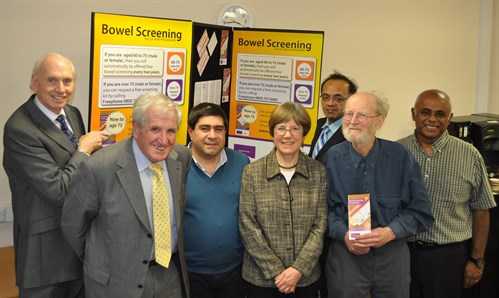
Following successful completion of the first two year cycle of bowel screening, the Department of Health recently took the decision to extend the age group of those who will be offered screening. From 1 January 2014, the age group for screening was extended to cover those aged 70 – 75. Previously the scheme ran for those aged 60 – 69, with screening available on request for those aged 70 and above.
Dr Parameswaran Kishore, Director of Public Health said:
'To date we have identified 15 cases of cancer thanks to the Bowel Screening Programme – this is potentially 15 lives saved. By extending the age to 75, we will be able to detect more cancers early and save more lives. The uptake rate for the screening programme on the Island is around 59% which compares favourably to 50% in the UK. We want to do all we can to increase the uptake number and will continue to raise awareness about this important initiative.'
Bowel cancer is the third most common cancer in the UK and the Isle of Man after lung and breast cancer, and is the second most common cause of cancer death after lung cancer. Between 2008 and the end of October 2013, 423 patients were admitted to Noble’s Hospital with confirmed bowel cancer.
Bowel Screening aims to detect bowel cancer at an early stage, before people experience any symptoms when treatment is more effective. If diagnosed early, bowel cancer is highly treatable; however not all bowel cancers are detected early and some are diagnosed too late.
Local resident Mr Jimmy Kneen, who had cancer detected through the screening programme said:
'I firmly believe in the benefits of the Bowel Screening Programme and my own experience has inspired me to come forward and speak about this. I had no feeling of any symptoms whatsoever and there was no history of bowel cancer in my family, it was just something out of the blue. My message is that everyone who has the opportunity should take part in this screening programme. I understand that some people find it difficult to talk about and do, but the test was quite simple. Don’t have second thoughts about returning the kit – it’s absolutely stupid not to take part in the screening programme.'
Mr Kneen also spoke of his experience at Noble’s Hospital during his treatment:
'I don’t believe the care I received at Noble’s Hospital could have been bettered by any hospital in Britain. I really cannot fault it.'
The Bowel Screening Programme commenced in July 2011, and now sees those aged between 60 and 75 receive a letter inviting them to participate in screening. The letter and kit comes from the UK NHS Midlands & North West Bowel Screening Office – based in Rugby, which was appointed to manage this programme on the Department’s behalf.
Around eight days following receipt of the letter a test kit will be posted enclosing the following items:
- a leaflet explaining how to complete the test
- a test card to collect the samples
- some card applicators to help apply the samples to the test card; and
- a prepaid reply envelope.
Another local resident, Mr Brian O’Hanlon, who also tested positive after using the screening kit – which he requested as he was outside of the age range – said:
'Don’t die of ignorance, bowel cancer can kill you – I had no symptoms. The test was very simple and easy to do. The people at Noble’s Hospital were first rate and we are very lucky to have such a capable team – I couldn’t have wished for better.'
Those like Mr O’Hanlon who are aged over 75 can request a free screening kit by calling Freephone 0800 707 6060. Those aged under 60 who have any concerns should contact their GP or Practice Nurse for further advice.
Member for Health Services, Dudley Butt MLC said:
'The bowel screening programme is a real success story – and it’s very encouraging to know that, potentially, 15 lives have been saved in the first two years. Despite difficult financial circumstances for public services, the Department has endeavoured to prioritise funding for this programme as part of our Health Strategy, which focuses on prevention over cure.
'Some people may be put off from taking part in this screening programme, but as the results to date demonstrate, it really can help save lives. The earlier the condition is detected the more likely there is to be a good outcome, and screening provides the best way of detecting the condition early. I would very much encourage all those aged 60 – 75 to participate in the programme.'
Bowel Cancer symptoms can include:
- a change in your normal bowel habit lasting 4 - 6 weeks or more
- bleeding from the bottom and/or blood in your faeces (poo)
- extreme, unexplained tiredness
- a pain and/or lump in your abdomen.
Anyone experiencing one or more of these symptoms should speak to their GP.
Further information about the Bowel Screening Programme is available online.

